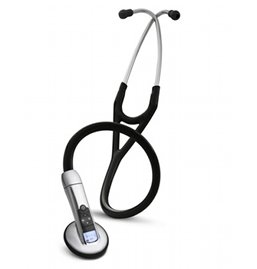Bluetooth 4.0 health monitors will arrive later this year
Jun 9, 2011 — by LinuxDevices Staff — from the LinuxDevices Archive — 8 viewsThe Bluetooth SIG is releasing new, health-oriented specifications for version 4.0 of its popular wireless technology. As a result, power-saving blood pressure monitors, glucose meters, and other devices should be available by the end of the year, the organization says.
 The Bluetooth SIG (Special Interest Group) is gradually rolling out specifications for a new generation of health-monitoring wireless devices based on the low-energy capabilities of Bluetooth 4.0. (Pictured at right: a Bluetooth-enabled stethoscope from 3M.)
The Bluetooth SIG (Special Interest Group) is gradually rolling out specifications for a new generation of health-monitoring wireless devices based on the low-energy capabilities of Bluetooth 4.0. (Pictured at right: a Bluetooth-enabled stethoscope from 3M.)
Wireless device manufacturers are already designing prototypes of Bluetooth 4.0 health-monitoring devices, and mobile phone manufacturers will embed the updated wireless specification in new products beginning in the fourth quarter of 2011, in time for the holidays.
"It's a whole new architecture," Suke Jawanda, chief marketing officer for the Bluetooth SIG, told eWEEK. Many types of devices could not connect previously using Bluetooth because they required too much power, he noted. "A big battery pack is not going to happen with a glucose meter," Jawanda said.
Founded in 1998, the Bluetooth SIG is a nonprofit trade association governing the standards for Bluetooth wireless technology. All companies incorporating Bluetooth technology into their devices join the Bluetooth SIG, which now has 14,000 member companies.
On June 7, the Bluetooth SIG announced profiles for thermometer and heart rate monitors. Bluetooth profiles are the set of rules ratified by the Bluetooth SIG and ready to be optimized for particular tasks, such as monitoring heart rates or taking blood glucose numbers, Jawanda said.
"We have dozens and dozens of profiles that are optimized that allow certain devices to act accordingly," Jawanda said.
For the thermometer profile, companies will design a thermometer path to transmit temperature readings to a patient's mobile phone every half hour to allow a caregiver to keep track of the patient's condition.
"All of that information can be sent to an application, and in one spot they've got a panorama of their health," Jawanda said.
On July 26, the Bluetooth SIG will publish on its website several other profiles, including Blood Pressure Profile and Search, which allows patients to measure their blood pressure, then send the readings to a mobile phone or PC using Bluetooth. Caregivers or doctors can access the information in the cloud and import the data into EHRs (electronic health records). Health insurance companies can also access the data through the cloud.
"You can liberate data and turn it into information on a phone, on a PC and in the cloud," Jawanda said.
The number of Bluetooth-enabled medical devices on the market could increase from 40 million to hundreds of millions over the next few years, Jawanda said.
Heart rate, temperature, and blood pressure monitors will be among the first Bluetooth 4.0 devices available, followed by weight scales, pedometers, and new blood glucose meters.
Companies that make Bluetooth health-monitoring devices include A&D Medical, Nonin, 3M and Omron. The devices are sold in retail stores such as pharmacies and through health care providers.
By the end of 2012, 100 percent of smartphones will feature version 4.0, according to the Bluetooth SIG. Bluetooth 4.0 radios happen to be cheaper and smaller than their 3.0 predecessors, Jawanda noted. "It's just the way the silicon has been spun," he said.
To enable data to be transferred securely in the cloud, the Bluetooth SIG is working with the Continua Health Alliance, a nonprofit group of 230 companies in health care and technology that certifies the devices as interoperable with other tech products.
Mobile health will be the first industry to benefit from Bluetooth 4.0, followed by smart homes and fitness, according to the Bluetooth SIG.
With 72 percent of physicians in the United States using smartphones, mobile technology is a key driver of health care IT growth, according to a report by research firm RNCOS.
Brian T. Horowitz is a contributor to eWEEK.
This article was originally published on LinuxDevices.com and has been donated to the open source community by QuinStreet Inc. Please visit LinuxToday.com for up-to-date news and articles about Linux and open source.